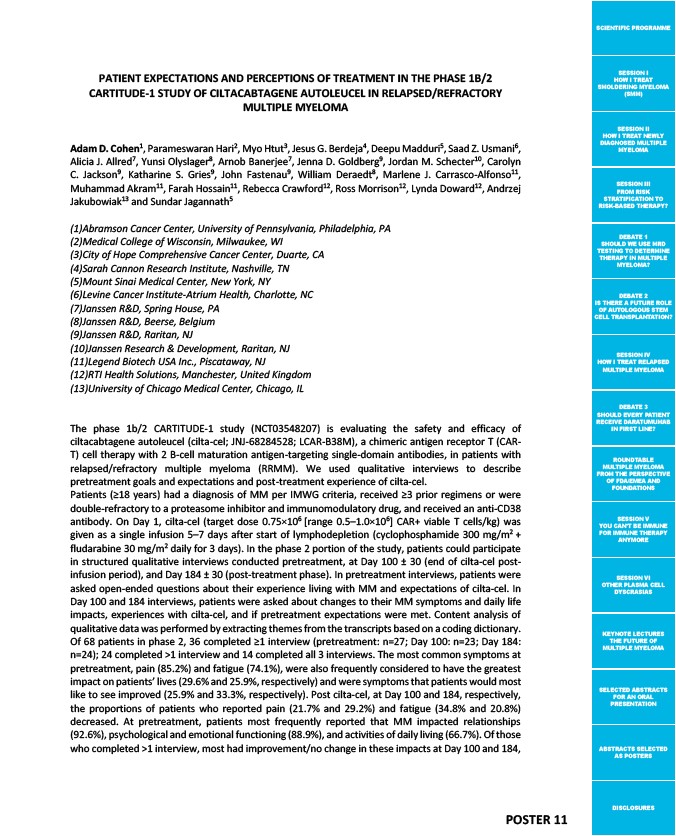
SCIENTIFIC PROGRAMME
SESSION I
HOW I TREAT
SMOLDERING MYELOMA
(SMM)
SESSION II
HOW I TREAT NEWLY
DIAGNOSED MULTIPLE
MYELOMA
SESSION III
FROM RISK
STRATIFICATION TO
RISK-BASED THERAPY?
DEBATE 1
SHOULD WE USE MRD
TESTING TO DETERMINE
THERAPY IN MULTIPLE
MYELOMA?
DEBATE 2
IS THERE A FUTURE ROLE
OF AUTOLOGOUS STEM
CELL TRANSPLANTATION?
SESSION IV
HOW I TREAT RELAPSED
MULTIPLE MYELOMA
DEBATE 3
SHOULD EVERY PATIENT
RECEIVE DARATUMUMAB
IN FIRST LINE?
ROUNDTABLE
MULTIPLE MYELOMA
FROM THE PERSPECTIVE
OF FDA/EMEA AND
FOUNDATIONS
SESSION V
YOU CAN’T BE IMMUNE
FOR IMMUNE THERAPY
ANYMORE
SESSION VI
OTHER PLASMA CELL
DYSCRASIAS
KEYNOTE LECTURES
THE FUTURE OF
MULTIPLE MYELOMA
SELECTED ABSTRACTS
FOR AN ORAL
PRESENTATION
ABSTRACTS SELECTED
AS POSTERS
DISCLOSURES
POSTER 11
PATIENT EXPECTATIONS AND PERCEPTIONS OF TREATMENT IN THE PHASE 1B/2
CARTITUDE-1 STUDY OF CILTACABTAGENE AUTOLEUCEL IN RELAPSED/REFRACTORY
MULTIPLE MYELOMA
Adam D. Cohen1, Parameswaran Hari2, Myo Htut3, Jesus G. Berdeja4, Deepu Madduri5, Saad Z. Usmani6,
Alicia J. Allred7, Yunsi Olyslager8, Arnob Banerjee7, Jenna D. Goldberg9, Jordan M. Schecter10, Carolyn
C. Jackson9, Katharine S. Gries9, John Fastenau9, William Deraedt8, Marlene J. Carrasco-Alfonso11,
Muhammad Akram11, Farah Hossain11, Rebecca Crawford12, Ross Morrison12, Lynda Doward12, Andrzej
Jakubowiak13 and Sundar Jagannath5
(1)Abramson Cancer Center, University of Pennsylvania, Philadelphia, PA
(2)Medical College of Wisconsin, Milwaukee, WI
(3)City of Hope Comprehensive Cancer Center, Duarte, CA
(4)Sarah Cannon Research Institute, Nashville, TN
(5)Mount Sinai Medical Center, New York, NY
(6)Levine Cancer Institute-Atrium Health, Charlotte, NC
(7)Janssen R&D, Spring House, PA
(8)Janssen R&D, Beerse, Belgium
(9)Janssen R&D, Raritan, NJ
(10)Janssen Research & Development, Raritan, NJ
(11)Legend Biotech USA Inc., Piscataway, NJ
(12)RTI Health Solutions, Manchester, United Kingdom
(13)University of Chicago Medical Center, Chicago, IL
The phase 1b/2 CARTITUDE-1 study (NCT03548207) is evaluating the safety and efficacy of
ciltacabtagene autoleucel (cilta-cel; JNJ-68284528; LCAR-B38M), a chimeric antigen receptor T (CAR-T)
cell therapy with 2 B-cell maturation antigen-targeting single-domain antibodies, in patients with
relapsed/refractory multiple myeloma (RRMM). We used qualitative interviews to describe
pretreatment goals and expectations and post-treatment experience of cilta-cel.
Patients (≥18 years) had a diagnosis of MM per IMWG criteria, received ≥3 prior regimens or were
double-refractory to a proteasome inhibitor and immunomodulatory drug, and received an anti-CD38
antibody. On Day 1, cilta-cel (target dose 0.75×106 range 0.5–1.0×106 CAR+ viable T cells/kg) was
given as a single infusion 5–7 days after start of lymphodepletion (cyclophosphamide 300 mg/m2 +
fludarabine 30 mg/m2 daily for 3 days). In the phase 2 portion of the study, patients could participate
in structured qualitative interviews conducted pretreatment, at Day 100 ± 30 (end of cilta-cel post-infusion
period), and Day 184 ± 30 (post-treatment phase). In pretreatment interviews, patients were
asked open-ended questions about their experience living with MM and expectations of cilta-cel. In
Day 100 and 184 interviews, patients were asked about changes to their MM symptoms and daily life
impacts, experiences with cilta-cel, and if pretreatment expectations were met. Content analysis of
qualitative data was performed by extracting themes from the transcripts based on a coding dictionary.
Of 68 patients in phase 2, 36 completed ≥1 interview (pretreatment: n=27; Day 100: n=23; Day 184:
n=24); 24 completed >1 interview and 14 completed all 3 interviews. The most common symptoms at
pretreatment, pain (85.2%) and fatigue (74.1%), were also frequently considered to have the greatest
impact on patients’ lives (29.6% and 25.9%, respectively) and were symptoms that patients would most
like to see improved (25.9% and 33.3%, respectively). Post cilta-cel, at Day 100 and 184, respectively,
the proportions of patients who reported pain (21.7% and 29.2%) and fatigue (34.8% and 20.8%)
decreased. At pretreatment, patients most frequently reported that MM impacted relationships
(92.6%), psychological and emotional functioning (88.9%), and activities of daily living (66.7%). Of those
who completed >1 interview, most had improvement/no change in these impacts at Day 100 and 184,